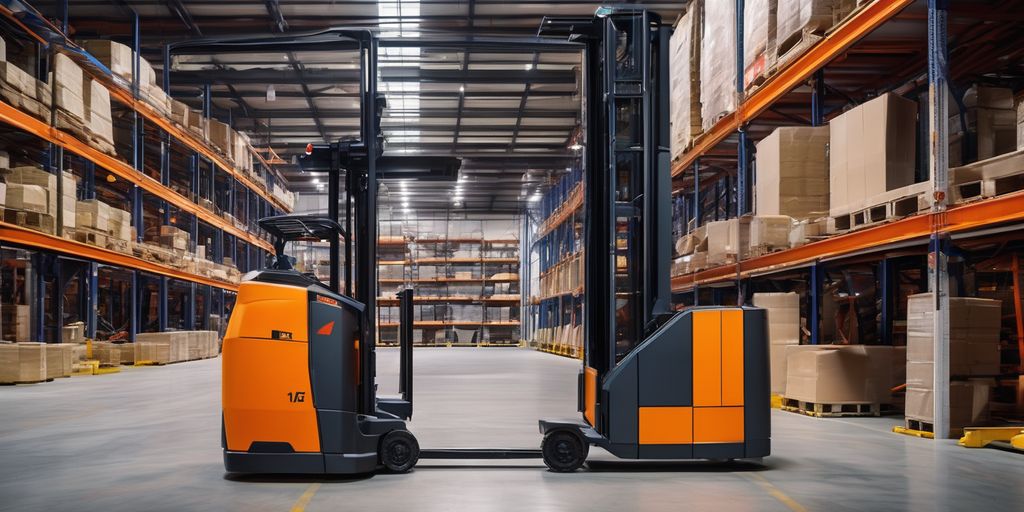Forklift Service Contracts: Ensuring Longevity and Reliability — overview
Forklifts are indispensable assets in various industries, playing a crucial role in material handling and logistics. Ensuring their longevity and reliability is paramount for maintaining operational efficiency and safety. Forklift service contracts offer a structured approach to regular maintenance, helping businesses avoid costly breakdowns and comply with regulatory standards. This article delves into the significance of forklift service contracts, their key components, and the benefits they bring to the table.
Key Takeaways
- Regular maintenance extends the lifespan of forklifts, maximizing return on investment and ensuring uninterrupted operations.
- Scheduled servicing improves forklift performance, identifying potential issues before they escalate into costly repairs.
- Adhering to maintenance schedules ensures compliance with safety regulations and reduces the risk of breakdowns.
- Partnering with a reputable maintenance provider offers access to technical expertise and emergency support.
- Predictive maintenance leverages data-driven insights to optimize maintenance schedules and prevent unexpected failures.
The Importance of Regular Forklift Maintenance
Regular forklift maintenance is essential for ensuring the safety, reliability, and efficiency of your equipment. Proper maintenance involves regular inspections of key components such as brakes, tires, hydraulic systems, and lifting mechanisms. Following a maintenance schedule helps identify potential issues early and address them promptly, reducing downtime and maintenance costs.
Safety and Compliance
Properly maintained forklifts are safer to operate, reducing the risk of accidents and injuries to operators, pedestrians, and other workers in the vicinity. Regular inspections and servicing help identify and address any potential safety hazards before they cause accidents or injuries.
Preventing Costly Breakdowns
By following a regular maintenance schedule and performing these checks diligently, operators can identify potential issues early, address them promptly, and keep their forklifts in optimal working condition. This proactive approach to maintenance not only ensures the safety of operators and other workers but also maximizes the efficiency, reliability, and longevity of the forklifts.
Maximizing Efficiency
Well-maintained forklifts operate more efficiently, leading to increased productivity, faster material handling, and smoother workflow processes. Regular servicing helps identify and address potential issues before they escalate, ensuring that forklifts remain reliable and operational when needed.
Regular maintenance not only prevents unexpected breakdowns but also significantly extends the life of your forklifts.
Key Components of a Forklift Service Contract
Routine Inspections
Routine inspections are a fundamental part of any forklift service contract. These inspections help in identifying potential issues before they escalate into major problems. Regular checks ensure that all safety features are functioning correctly and that the forklift complies with regulations. This proactive approach not only enhances safety but also maximizes efficiency and reliability.
Emergency Support
Emergency support is crucial for minimizing downtime and maintaining productivity. A comprehensive service contract should include provisions for rapid response in case of unexpected breakdowns. This ensures that your forklift fleet remains operational, reducing the risk of costly interruptions to your business operations.
Technical Expertise
Having access to technical expertise is essential for effective forklift maintenance. Service contracts should provide access to skilled technicians who can perform detailed inspections, troubleshoot issues, and carry out necessary repairs. This level of expertise helps in maintaining the longevity and reliability of your forklifts, protecting your investment and enhancing overall performance.
Benefits of Scheduled Forklift Servicing
Extended Lifespan
Scheduled maintenance maximizes the lifespan of your forklifts, identifying potential issues before they escalate into costly repairs. With routine servicing, critical components are inspected, lubricated, and adjusted, ensuring optimal performance and reliability. This proactive approach not only reduces downtime but also minimizes the risk of unexpected failures during operation.
Improved Performance
Regular servicing helps identify and address potential issues before they become major problems, reducing the risk of breakdowns and improving productivity. Well-maintained forklifts operate more efficiently, leading to increased productivity, faster material handling, and smoother workflow processes.
Cost Savings
Early detection of problems in the forklift’s mechanism will save you money as the cost of sudden downtime is much greater than that of routine services. Properly maintained forklifts are safer to operate, reducing the risk of accidents and injuries to operators, pedestrians, and other workers in the vicinity.
Regular service is an essential routine for your forklift. It ensures that your forklift works smoothly with the proper mechanism. It will also enable you to detect problems in any part of the forklift and prevent it from breaking down.
Choosing the Right Forklift Maintenance Provider

Selecting the right forklift maintenance provider is crucial for ensuring the longevity and reliability of your equipment. Partnering with a reputable maintenance provider grants access to technical expertise and support, ensuring that your forklifts receive the highest standard of care.
Understanding Predictive Maintenance for Forklifts
Data-Driven Insights
Predictive maintenance programs may require significant initial and ongoing investments in sensors, software, personnel, and training. By leveraging data-driven insights, businesses can anticipate potential issues before they become major problems. This approach not only enhances the reliability of forklifts but also maximizes efficiency in forklift fleet management.
Preventive Measures
A good preventive, predictive, lubrication, and reactive maintenance program can boost your operations and improve your site’s reliability. Implementing preventive measures allows for the early detection and correction of potential issues, such as fluid leaks or worn components, ensuring forklifts operate more reliably and experience fewer breakdowns over time.
Optimizing Maintenance Schedules
By creating a maintenance plan, monitoring effectiveness, and optimizing facility layout for better operations, businesses can ensure their forklifts are always in top condition. This proactive approach not only reduces downtime but also minimizes the risk of unexpected failures during operation.
Scheduled maintenance maximizes the lifespan of your forklifts, identifying potential issues before they escalate into costly repairs. With routine servicing, critical components are inspected, lubricated, and adjusted, ensuring optimal performance and reliability.
Ensuring Compliance with Regulatory Standards
Ensuring compliance with regulatory standards is crucial for maintaining a safe and efficient workplace. Adhering to guidelines not only helps in avoiding fines and penalties but also fosters a culture of safety within the organization.
Adhering to Guidelines
Compliance with safety standards, such as OSHA guidelines, is facilitated through routine maintenance, aligning with warehouse safety objectives. By adhering to manufacturer-recommended maintenance schedules and conducting thorough inspections, businesses demonstrate their commitment to regulatory compliance and workplace safety. This proactive approach not only mitigates the risk of fines and penalties but also fosters a culture of safety within the organization.
Documentation and Record-Keeping
Proper documentation ensures compliance with these regulations by providing evidence of regular inspections, maintenance activities, and safety checks. Keeping detailed records of service and inspections contributes to demonstrating compliance during audits or inspections.
Safety Audits
Regulatory bodies often have specific maintenance requirements for forklifts. Adhering to these guidelines helps ensure compliance with safety and environmental regulations. Regular maintenance and keeping detailed records of service and inspections contribute to demonstrating compliance during audits or inspections.
Maximizing ROI Through Effective Forklift Maintenance
Effective forklift maintenance is crucial for protecting your investment. By addressing issues promptly and performing regular maintenance tasks, businesses can extend the lifespan of their forklifts and maximize ROI. This ensures the uninterrupted flow of goods within their facilities.
Regular maintenance helps in identifying potential issues before they escalate into costly repairs. This proactive approach not only reduces downtime but also minimizes the risk of unexpected failures during operation. Scheduled maintenance maximizes the lifespan of your forklifts, ensuring optimal performance and reliability.
Optimized performance is achieved through regular maintenance tasks such as lubrication, adjustments, and component replacements. By maintaining optimal operating conditions, forklift components experience less wear and tear, leading to a longer lifespan for the equipment. This proactive approach enhances productivity and ensures that forklifts operate at peak performance levels.
Businesses can extend the lifespan of their forklifts, maximize ROI, and ensure the uninterrupted flow of goods within their facilities.
Conclusion
In conclusion, forklift service contracts are indispensable for ensuring the longevity and reliability of these crucial pieces of equipment. Regular maintenance not only extends the lifespan of forklifts, maximizing return on investment, but also enhances their reliability, reducing the risk of unexpected breakdowns and costly downtime. By adhering to a consistent maintenance schedule, businesses can ensure compliance with safety regulations, improve operational efficiency, and maintain a seamless flow of goods within their facilities. Partnering with a reputable maintenance provider offers the added benefits of technical expertise and comprehensive support, further safeguarding the performance and reliability of your forklift fleet. Ultimately, investing in a forklift service contract is a proactive step towards optimizing productivity, ensuring safety, and achieving long-term cost savings.
Frequently Asked Questions
Why is forklift servicing important?
Forklift servicing is crucial for maintaining the safety, reliability, and longevity of your forklift. Regular servicing helps identify and address potential issues before they become major problems, reduces the risk of breakdowns, improves productivity, and ensures compliance with safety regulations.
How often should I have my forklift serviced?
The frequency of forklift servicing depends on various factors such as usage, environment, and manufacturer recommendations. Generally, it is advisable to have forklifts serviced every 3-6 months or after a specific number of operating hours.
What are the benefits of scheduled forklift servicing?
Scheduled forklift servicing maximizes the lifespan of your forklifts, improves performance, reduces downtime, and minimizes the risk of unexpected failures. It also ensures compliance with regulatory standards and contributes to overall cost savings.
What should be included in a forklift service contract?
A comprehensive forklift service contract should include routine inspections, emergency support, technical expertise, and detailed documentation of all maintenance activities. It should also outline the scope of services, response times, and any warranties or guarantees provided by the service provider.
How does predictive maintenance benefit forklift operations?
Predictive maintenance uses data-driven insights to identify potential issues before they become major problems. This proactive approach helps in optimizing maintenance schedules, reducing unexpected breakdowns, and ensuring the continuous operation of forklifts.
What is the importance of compliance with regulatory standards in forklift maintenance?
Adhering to regulatory standards ensures the safety of operators and other workers, prevents legal issues, and contributes to the overall efficiency of forklift operations. Regular maintenance and detailed record-keeping are essential for demonstrating compliance during audits or inspections.




Leave a comment
This site is protected by hCaptcha and the hCaptcha Privacy Policy and Terms of Service apply.